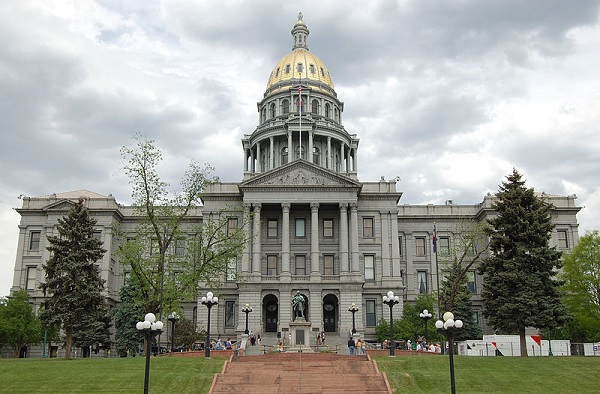bulletin news online news
By Robbie Sequeira
Stateline.org
(Stateline.org) In her first few months as a Minnesota state legislator in 2021, state Rep. Kaela Berg often wondered: “What the hell am I doing here?” online news
A single mother and flight attendant without a college degree or prior political experience, Berg now had a seat at the legislative table, shaping policy decisions in her home state.
As she ran against a former two-term Republican representative — a commercial real estate agent — she also was struggling for housing and living in a friend’s basement.
“I’m living in [her] basement, running for office, and the pandemic hits,” said Berg. “I went from three jobs to one. … I found that while I can pay my bills, I can’t qualify for a new apartment because you have to show two or three times the rent and I can’t do that.”
While it was gratifying to receive support from working families in her district, her transition to state policymaker felt overwhelming.
“I had the worst case of impostor syndrome,” Berg, a member of Minnesota’s Democratic-Farmer-Labor Party, said in an interview. “I’m thinking, ‘Who do I think I am? I’m a working flight attendant. I don’t have a college degree. Why did I let somebody talk me into this?’”
Berg is a rarity in politics: a working-class state legislator.
bulletin news online news
Just 116 of the nearly 7,400 state legislators in the United States come from working-class backgrounds, according to a biennial study conducted by Nicholas Carnes and Eric Hansen, political scientists at Duke University and Loyola University Chicago, respectively.
The researchers define legislators as “working class” if they currently or last worked in manual labor, service industry, clerical or labor union jobs. They found that 1.6% of state lawmakers meet that definition, compared with 50% of U.S. workers. Only about 2% of Democrats and 1% of Republicans qualified as working class.
Ten states — Arkansas, Louisiana, Mississippi, North Carolina, Oregon, South Carolina, Tennessee, Texas, Utah and Virginia — have no working-class state lawmakers.
The dearth of working-class legislators raises concerns that economic challenges such as wage stagnation and the rising cost of living will get short shrift in state capitols.
Working-class politicians are more likely to have personally experienced economic hardship, so they are more interested in policies to mitigate it, Carnes said. And they often propose solutions that differ from those put forward by colleagues who aren’t working class, even if it means diverging from party doctrine.
“State legislatures make consequential decisions, and if you have an entire economic class of people that are not in the room when policy decisions are being made, that’s going to tilt the kind of problems politicians pay attention to,” said Carnes. “It also dictates the kinds of solutions they consider against the interests of whoever’s out of the room.”
Working-class representation in state legislatures has always been low, he noted, but the most recent count is even lower than it was two years ago, when the percentage was about 1.8%.
The state legislature with the highest percentage of working-class lawmakers is Alaska, with 5% — that’s three of 60 lawmakers. Maine has the highest total number of working-class legislators, eight of 151 legislators, with a transportation worker and a bartender among the ranks.
Working-class issues
buletin news online news
After a 32-year career as an electrician, Democratic state Rep. Nate Roberts was part of a new wave of first-time Idaho lawmakers entering office in 2023.
Roberts knew that it wasn’t just his relative political inexperience that separated him from the rest of his colleagues.

He also was one of the only state lawmakers who had worked a union job. And during his first few weeks in office, he was shocked by how rarely issues such as wage theft, low pay and housing affordability had been talked about in committee meetings.
“That’s when I realized that the only person that’s going to advocate for working-class people is a working-class person,” he told Stateline. “When I moved from state to state working different jobs, I realized how differently states were influenced when it came to policies for working people.”
Roberts learned the power of unions as a journeyman — and fighting to increase worker protections has become his life, he said.
Idaho is one of 26 so-called right-to-work states, where no person can be forced, as a condition of employment, to join a union. Such laws limit unions’ bargaining power.
Roberts would like Idaho to follow the lead of Michigan, which in 2023 became the first state in decades to repeal a right-to-work law. That is unlikely in Idaho, given the state’s conservative political orientation. But Roberts also is pushing to update Idaho’s child labor laws, which were enacted in 1907 and have been superseded by the federal Fair Labor Standards Act of 1938.
Roberts said his experience as a laborer in his younger years has emboldened him to speak out against legislation such as a Senate bill that would repeal limits on the number of hours and how late in the day a child under the age of 16 can work.
“I’m still shocked when I get pushback for going against these bills, particularly ones that I feel regress our child labor laws,” said Roberts. “I’ve experienced it. We need to not only protect our kids, but we also need to protect our workers.”
bulletin news online news
The political climate is far different in Minnesota, where the Democratic-Farmer-Labor Party has controlled the governor’s office, the state House and the state Senate since January 2023. Last year, the state enacted a major package of labor-friendly laws.
Minnesota also passed a slew of tenant-landlord laws, with protections favoring the state’s renters.
Berg said the backgrounds of working-class legislators like herself can inform statehouse conversations, even if lawmakers with different backgrounds support pro-labor policies.
“I don’t think there’s enough value in having people with lived experience in the legislature,” Berg said. “When you take someone who … still lives paycheck to paycheck, they are bringing that personal experience to fight for a bill that will impact working families.”
For Wisconsin state Rep. Jenna Jacobson, joining the legislature in 2023 was a lot like “drinking from a fire hose,” she recalled.
One of her policy priorities — expanding aid for free school meals— was influenced by her experience as a schoolkid.
“I was one of the kids on free and reduced lunches growing up. I had the special colored cards because of that,” said Jacobson, a Democrat. “I know so many of our kids who are in a similar spot.”
Barriers abound
For working-class Americans, financial and societal barriers are a major disincentive to pursuing state offices, said Amanda Litman, co-founder and co-executive director of Run for Something, a progressive organization that recruits candidates for down-ballot races.
bulletin news online news
A 2021 national survey by Tufts University found that local candidates who experienced poverty in their youth felt especially constrained.
(Please click onto the image of the cat to hear Classical music)

The eligibility criteria for statewide office vary greatly by state. Only five states — Arizona, Connecticut, Hawaii, Maine and Minnesota — allow public financing options for candidates vying for state legislative seats.
“Structurally, it’s really hard for people who aren’t already rich, or already independently wealthy, have rich partners or rich families to enter politics,” Litman said. “And the gatekeepers at the state level have typically recruited candidates who were safe bets, which is a candidate who can independently raise money.”
Becoming comfortable wielding political power as a working-class person is a transition that can take a while, Indiana Republican state Rep. Peggy Mayfield told Stateline.
Mayfield, who worked as a secretary at the insurance company she and her husband owned together, is now a 12-year veteran in the legislature who knows how to navigate state politics and get bills passed.
But running for office, much less holding state office, is time-consuming and requires sacrifices, she said.
“If I had an employee who came to me and said, ‘I wanna run for office,’ I’m faced with saying, ‘I’m gonna let you off four months a year,’ or make a difficult choice,” said Mayfield, describing how hard it is for many workers who don’t have that privilege. “Running for office itself becomes a full-time job … and for some in the working class it may not make sense to go into politics, if they can pursue more profitable opportunities in the private sector.”
bullletin news online news
Some states have worked to raise legislative pay, which could entice more working-class people to take a shot at elective office.
Earlier this year, Kansas raised salaries for rank-and-file lawmakers from about $29,000 to $57,000 after some said the lower pay wasn’t enough to live on. Arizona, Kentucky, New Jersey and Vermont are among the states with measures this session that could increase lawmakers’ pay.
New York passed legislation in 2022 that made its lawmakers the highest paid in the country. Pennsylvania has cost-of-living adjustments.
Roberts, the electrician-turned-lawmaker in Idaho, said: “We don’t do this for the pay, and some of us certainly aren’t getting rich off this job. Some of us are making ends meet.
“But we have residents who are also making ends meet, and they rely on us to speak on the issues affecting them, and that’s what keeps you going,” Roberts added.
Lawmakers in Idaho make $19,927, after a pay raise passed in 2022.
Another barrier for would-be working-class lawmakers, Carnes said, is running a viable campaign against more established political candidates. The working class needs infrastructure and coalition-building to compete politically, he said, similar to women candidates who get support from EMILY’s List (a pro-abortion rights group).
“The solution is pretty straightforward,” said Carnes. “If you commit to working-class people and partner with labor unions and political parties on recruiting and training working-class people to run for office — it’s possible you will see more working-class state legislators.”
In Minnesota, Rep. Berg soon realized that her best legislative asset was her ability to vouch for the working experiences of everyday Minnesotans.
A flight attendant for Endeavor Air, Berg has signed on to a bill that, among other provisions, would delete the exemption for air flight crews in the state’s law on employee sick time. Her experience allowed her to confidently explain to legislative peers how the exemption had hurt flight crews.
“Government works best when all types of personal experience are at the legislative table,” Berg said. “I knew that I was uniquely able to speak on issues that my other colleagues never experienced.”
©2024 States Newsroom. Visit at stateline.org. Distributed by Tribune Content Agency, LLC.
bulletin news online news


